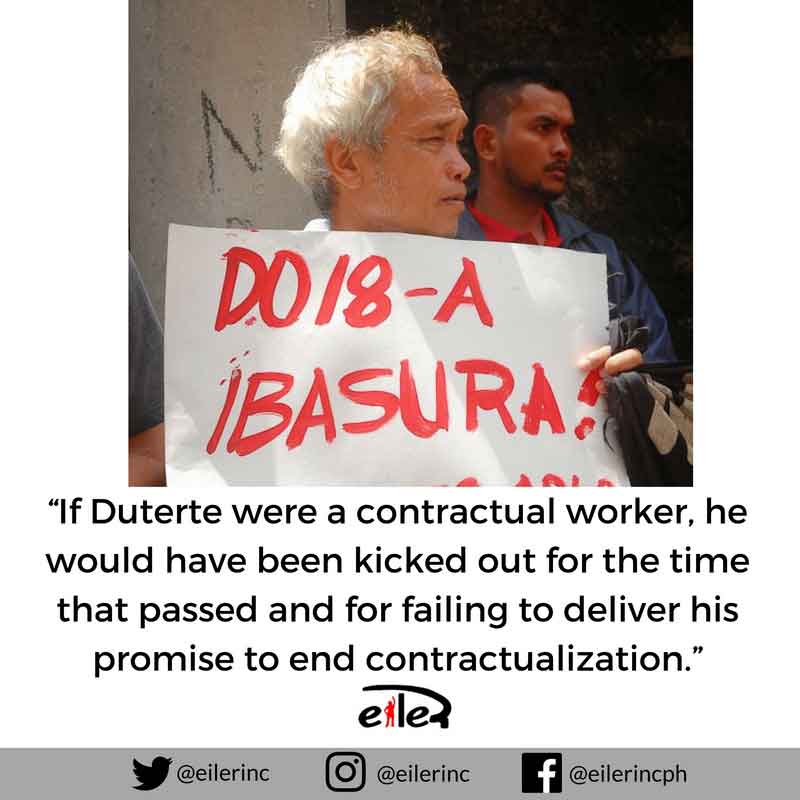
The Duterte administration had five months to end labor contractualization or the “endo scheme”
but rampant hiring of temporary workers by companies via manpower agencies continues, according
to a labor nongovernment organization.
The Ecumenical Institute for Labor Education and Research (EILER) said while the Department of
Labor and Employment (DOLE) has repeatedly vowed to address the issue of short-term hiring, no
significant change has happened.
“If Duterte were a contractual worker, he would have been kicked out for the time that passed and
for failing to deliver his promise to end contractualization,” said EILER Deputy Executive Director
Rochelle Porras. “Efforts of the labor department such as the issuance of Department Order 162 and
the holding of labor summits across the country make it appear that something is being done but in
fact, these are just moves to appease the growing clamor to end contractualization,” she added.
The labor NGO noted that DOLE’s DO 162 only banned the issuance of licenses to new contractors
and left already registered contractors untouched. The so-called “win-win solution” by Secretary
Silvestre Bello III meanwhile is a rehash of Aquino’s Department Order 18-A or the order legalizing
the use of contractors and subcontractors.
EILER said that under the win-win solution, contractual workers will only be regularized with the
agencies and not with the principal employers. The labor NGO also expresses dismay over the
pronouncement of Secretary Bello on the release of DO 30 on December 28. The new DO is set to be
an improvement of DO 18-A, but this kind of reform is far from the workers’ demand to repeal all
department orders and policies allowing labor contractualization in the country.
“In addition, the recently held Labor Summit became ‘Labor Sabit’, with labor representatives
serving as mere attachments to the “win-win” solution to make it appear that it has the nod of
workers. In reality, the solution is a double victory for capitalists and the government,” Porras said.
The labor institute also noted that DOLE mulled at inspecting retail giant and contractualization king
SM owned by Henry Sy, but so far not a single inspection of SM malls has materialized.
Actual cases:
- On June 22, 2015 DOLE decided that the 103 workers of Tanduay Distillers Inc. should be
regularized, but until today, their struggle continues as business tycoon Lucio Tan rejects this
decision with the aid of local government and goons. - Sorosoro Ibaba Development Corporation (SIDC) in Batangas City has more than 300 regular
and 300 contractual workers. They won a back-to-work order in favor of the dismissed
contractuals, but this is not implemented as DOLE has not yet issued the implementation
order. - Manila Cordage Corporation and Manco Synthetics Inc. (MCC-MSI) have 461 workers, 400 of
which are contractuals (employed by agencies), deemed illegal according to DOLE. However,
this declaration was conveniently neglected by the Labor Arbiter in denying their union
recognition after the certification election (CE) and they went on strike on May 4. - Ninety-eight workers of Samahang Manggagawa ng Golden Fortune Workers Union-NFWU
went on strike two years ago, because the management preempted the formation of their
union. The building they constructed is already finished, but their picket continues. The labor
department recently ordered 14 of the workers to report back for work but without an
implementation order. - Workers of Topboss Plastics Corporation were forming their union. Although some have
already worked for the company through an agency for up to 10 years, they still have to sign
every five months a new contract of employment. Three days before their certification
election (CE) on July 3, the company closed shop.
These concrete examples show that contractualization continues to burden workers and violate their
rights. Moreover, these expose that the promises of the current administration don’t hold much
ground as no concrete implementation plans had been laid out in favor of the workers.
“The solution proposed is truly a win-win for both private sector and the government and not for the
Filipino workers who remains shackled to low wages, unstable employment and are denied of union
and bargaining rights,” Porras added. “What will bring genuine change to the workers’ conditions are
the banning of all forms of contractualization, regularization of workers and the passing of a national
minimum wage.”
